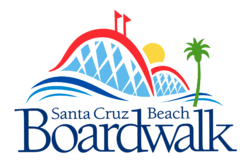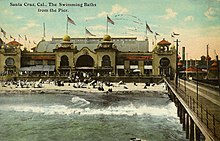Santa Cruz Beach Boardwalk
The Santa Cruz Beach Boardwalk is an oceanfront amusement park in Santa Cruz, California. Founded in 1907, it is California's oldest surviving amusement park[1] and one of the few seaside parks on the West Coast of the United States.
 | |
| Location | Santa Cruz, California, United States |
|---|---|
| Coordinates | 36°57′51″N 122°01′04″W |
| Owner | Santa Cruz Seaside Company |
| Opened | 1907 |
| Operating season | Year-round (limited operation November–February) |
| Attractions | |
| Total | 35 |
| Roller coasters | 3 |
| Water rides | 1 |
| Website | beachboardwalk |
| Reference no. | 983 |
Description
The Boardwalk extends along the coast of the Monterey Bay, from just east of the Santa Cruz Municipal Wharf to the mouth of the San Lorenzo River. At the western edge of the park lies a large building originally known as The Plunge, now Neptune's Kingdom, a pirate-themed recreation center which contains a video arcade and an indoor miniature golf course. Next to this is the Casino Fun Center which includes a laser tag arena and next to that is the Cocoanut Grove banquet room and conference center. A Laffing Sal automated character, from San Francisco's Playland, is viewable near the miniature golf course.

East of the Casino, the boardwalk portion of the park stretches along a wide, sandy beach visitors can access easily from the park. The eastern end of the boardwalk is dominated by the Giant Dipper, a wooden roller coaster that is one of the most visible landmarks in Santa Cruz. The Dipper and the Looff Carousel, which still contains its original 342-pipe organ built in 1894, are both on the US National Register of Historic Places. They were, together, declared to be a National Historic Landmark in 1987[2] and the park is California Historical Landmark number 983.[3]
There are old-fashioned carnival games and snack booths throughout the 24-acre (9.7 ha) park. It is located at 400 Beach Street in Santa Cruz, 36°57′51″N 122°01′04″W south of the Ocean Street exit of California State Route 1, which is the southern terminus of California State Route 17.
History

The beach was a destination for railroads and trolleys from 1875. From 1927 to 1959 Southern Pacific Railroad ran Suntan Special excursion trains to the park from San Francisco, Oakland, and San Jose every summer Sunday and holiday.[4] A short passenger service to Henry Cowell Redwoods State Park was restored in 1985.
The Santa Cruz, Big Trees and Pacific Railway stops in front of the park.[5]
As of 2011, the park is headed by Charles Canfield, the son of Laurence Canfield, the president of the park from the 1950s until the early 1980s. It has won the Best Seaside Amusement Park Award from Amusement Today every year since 2007 except for 2015.[6] Although there is no admission and the beach is public, parking is charged a fee when the rides are open. Season or day passes can be purchased or tickets for one dollar; each ride costs between 3 and 7 tickets.[7][8]
Boardwalk's Coconut Grove
The Boardwalk's Cocoanut Grove conference center includes banquet rooms and a performing arts venue at the Santa Cruz Beach Boardwalk. Food, drink, and theater were profitable aspects of the resort since the original Casino of Swanton in 1904. Although gambling was never legal, it was generally known that guests could take boats from the "pleasure pier" to a ship in the harbor to play games of chance in the early days. During Prohibition from 1920 to 1933, serving alcoholic drinks was also outlawed and the Casino changed its name to Cocoanut Grove. The name includes an old spelling of Coconut, Cocos nucifera, which was used in the popular Marx Brothers movie The Cocoanuts of 1929. The name was also used by a number of popular nightclubs of the era, including one in The Ambassador Hotel in Los Angeles, California.[9]
In the 1930s and 1940s, the Grove was a popular spot for major big band acts, including Stan Kenton, Benny Goodman, Lionel Hampton and Tommy Dorsey.[10]
Today, the Grove rarely hosts musical acts. It is a venue for weddings, banquets, school formal occasions and reunions, and corporate events. The Grand Ballroom and Sun Room complexes include over 20,000 square feet (1,900 m2) of space and commercial kitchens.[9]
References
- "Santa Cruz Booardwalk class amusement park". www.californiadaytrips.com. Retrieved 2016-05-25.
- "NATIONAL HISTORIC LANDMARKS PROGRAM" (PDF). www.nps.gov. Retrieved 2016-05-25.
- "Santa Cruz County". California Historical Landmark web site. State of California Office of Historic Preservation. Retrieved June 11, 2010.
- "SP and the Suntan Special" (PDF). History of in Santa Cruz County. Retrieved 18 August 2019.
- "Roaring Camp Railroads -— Santa Cruz Beach Train". official web site. Santa Cruz, Big Trees and Pacific Railway. Retrieved May 2, 2015.
- "All-time Winners By Category". Golden Ticket Awards. Amusement Today. Retrieved 30 January 2018.
- "Ticket Information". Santa Cruz Beach Boardwalk web site. Santa Cruz Seaside Company. Archived from the original on June 8, 2010. Retrieved June 12, 2010.
- beachboardwalk.com
- "Frequently Asked Questions about the historic Cocoanut Grove". Cocoanut Grove website. Retrieved June 10, 2010.
- Valerie Gladstone (May 14, 2000). "DANCE; They Come to the Dance Floor Bearing a Gift: Jazz". New York Times. Retrieved June 10, 2010.
Further reading
- Santa Cruz Seaside Company (April 1, 2007). The Santa Cruz Beach Boardwalk - A Century by the Sea. Ten Speed Press. ISBN 978-1-58008-814-5.
External links
| Wikimedia Commons has media related to Santa Cruz Beach Boardwalk. |
- "Santa Cruz Beach Boardwalk". Official web site.
- Cocoanut Grove Official site
- Santa Cruz Beach Boardwalk at the Roller Coaster DataBase
